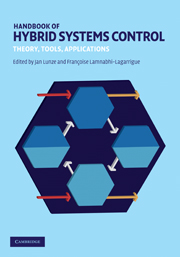Book contents
- Frontmatter
- Contents
- List of contributors
- Preface
- Notation
- Part I Theory
- 1 Introduction to hybrid systems
- 2 Survey of modeling, analysis, and control of hybrid systems
- 3 Hybrid automata
- 4 Switched and piecewise affine systems
- 5 Further switched systems
- 6 Hybrid systems: quantization and abstraction
- 7 Stochastic hybrid systems
- Part II Tools
- Part III Applications
- References
- Index
5 - Further switched systems
from Part I - Theory
Published online by Cambridge University Press: 21 February 2011
- Frontmatter
- Contents
- List of contributors
- Preface
- Notation
- Part I Theory
- 1 Introduction to hybrid systems
- 2 Survey of modeling, analysis, and control of hybrid systems
- 3 Hybrid automata
- 4 Switched and piecewise affine systems
- 5 Further switched systems
- 6 Hybrid systems: quantization and abstraction
- 7 Stochastic hybrid systems
- Part II Tools
- Part III Applications
- References
- Index
Summary
Mixed logical dynamical systems and linear complementarity systems are representations of switched systems, which under the conditions described here are equivalent to the model used in Chapter 4. They are particularly useful for model-predictive control. The equivalences of several hybrid system models show that different models, which are suitable for specific analysis and design problems and have been investigated in detail, cover the same class of hybrid systems. The analysis of the well-posedness of the models leads to conditions on the model equations under which a unique solution exists.
Model-predictive control of hybrid systems
Model-predictive control (MPC) is a widely used technology in industry for control design of highly complex multivariable processes. The idea behind MPC is to start with a model of the open-loop process that explains the dynamical relations among system's variables (command inputs, internal states, and measured outputs). Then, constraint specifications on system variables are added, such as input limitations (typically due to actuator saturation) and desired ranges where states and outputs should remain. Desired performance specifications complete the control problem setup and are expressed through different weights on tracking errors and actuator efforts (as in classical linear quadratic regulation). At each sampling time, an open-loop optimal control problem based on the given model, constraints, weights, and with initial condition set at the current (measured or estimated) state, is repeatedly solved through numerical optimization.
Information
- Type
- Chapter
- Information
- Handbook of Hybrid Systems ControlTheory, Tools, Applications, pp. 139 - 192Publisher: Cambridge University PressPrint publication year: 2009
Accessibility standard: Unknown
Why this information is here
This section outlines the accessibility features of this content - including support for screen readers, full keyboard navigation and high-contrast display options. This may not be relevant for you.Accessibility Information
- 1
- Cited by
